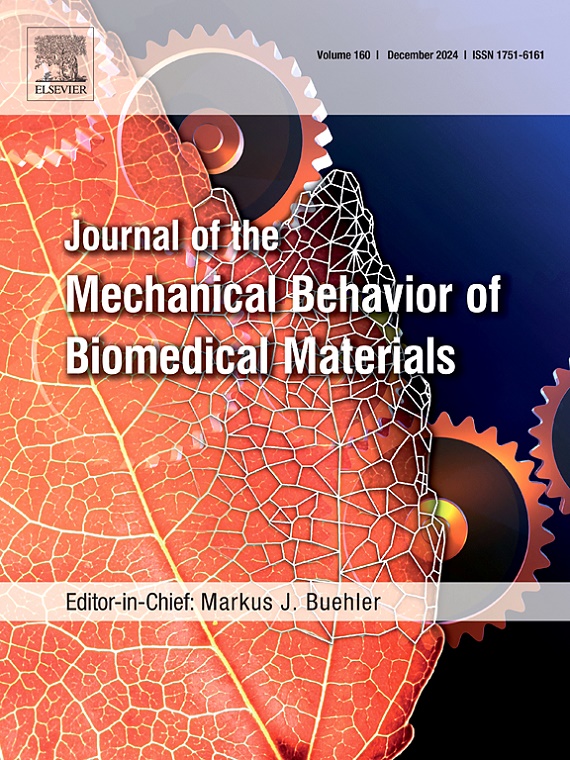生物医学用Ti-6Al-4V钛合金的单点增量成形:工艺优化和体外生物相容性评估
IF 3.5
2区 医学
Q2 ENGINEERING, BIOMEDICAL
Journal of the Mechanical Behavior of Biomedical Materials
Pub Date : 2025-08-08
DOI:10.1016/j.jmbbm.2025.107147
引用次数: 0
摘要
钛及其合金具有优异的力学性能、耐腐蚀性和生物相容性,在生物医学领域得到了广泛的应用。然而,制造工艺参数、产生的表面特性和生物性能之间的关系仍然知之甚少,限制了患者特异性植入物的优化。本研究研究了单点增量成形(SPIF)工艺参数对具有系统变化表面粗糙度的Ti-6Al-4V ELI器件力学性能和生物性能的综合影响。生物性能被全面定义为包括生物相容性、无诱变效应和促进成骨分化。在450°C的温度下,采用不同刀具直径、壁角和台阶深度组合的SPIF制备Ti样品。通过表面表征和化学成分、显微结构分析、硬度测量、润湿性、细胞毒性和遗传毒性测试对SPIFed钛植入物进行综合评价。SPIF样品的表面粗糙度差异显著,在所有时间点均表现出良好的生物相容性,无论是直接的还是间接的。表面粗糙度显著影响细胞行为,事实上,粗糙度最低的测试显示出最高的直接细胞增殖率,这也得到了化学表面组成和接触角测量结果的支持。在任何标本中均未检测到致突变潜能。此外,基因表达分析显示,所有SPIF表面的成骨标志物显著上调,粗糙度最低的标本BMP-2和ALP表达最高。本研究表明,SPIF工艺参数通过对Ti-6Al-4V种植体表面形貌和微观结构的影响,对其力学性能和生物性能都有重要影响,强调通过可控的SPIF工艺优化表面粗糙度可以显著提高钛种植体的生物性能。本文章由计算机程序翻译,如有差异,请以英文原文为准。

Single point incremental forming of Ti-6Al-4V titanium alloy for biomedical applications: Process optimization and in vitro biocompatibility assessment
Titanium and its alloys are widely utilized in biomedical applications due to their excellent mechanical properties, corrosion resistance, and biocompatibility. However, the relationship between manufacturing process parameters, resulting surface characteristics and biological performance remains poorly understood, limiting the optimization of patient-specific implants. This study investigates the integrated effects of Single Point Incremental Forming (SPIF) process parameters on both mechanical properties and bioperformance of Ti-6Al-4V ELI devices with systematically varied surface roughness. Biological performance is comprehensively defined to include biocompatibility, absence of mutagenic effects, and the stimulation of osteogenic differentiation. Ti specimens were manufactured using SPIF with different combinations of tool diameter, wall angle, and step depth at 450 °C. The SPIFed Ti implants were comprehensively evaluated through surface characterization and chemical composition, microstructural analysis, hardness measurements, wettability, cytotoxicity and genotoxicity tests. Surface roughness varied significantly among SPIF specimens and all of them demonstrated excellent biocompatibility at all time points in both direct and indirect assays. Surface roughness significantly influenced cell behavior, indeed the test characterized by the lowest roughness exhibited the highest direct cell proliferation rate, which was also supported by the results obtained from the chemical surface composition and contact angle measurements. No mutagenic potential was detected in any specimen. Furthermore, gene expression analysis revealed significant upregulation of osteogenic markers across all SPIF surfaces, with specimen having lowest roughness achieving maximal BMP-2 and ALP expression. This study demonstrates that SPIF process parameters critically influence both mechanical and biological performance of Ti-6Al-4V implants through their effects on surface topography and microstructure, highlighting that the optimization of surface roughness through controlled SPIF processing can significantly improve the bioperformance of titanium implants.
求助全文
通过发布文献求助,成功后即可免费获取论文全文。
去求助
来源期刊

Journal of the Mechanical Behavior of Biomedical Materials
工程技术-材料科学:生物材料
CiteScore
7.20
自引率
7.70%
发文量
505
审稿时长
46 days
期刊介绍:
The Journal of the Mechanical Behavior of Biomedical Materials is concerned with the mechanical deformation, damage and failure under applied forces, of biological material (at the tissue, cellular and molecular levels) and of biomaterials, i.e. those materials which are designed to mimic or replace biological materials.
The primary focus of the journal is the synthesis of materials science, biology, and medical and dental science. Reports of fundamental scientific investigations are welcome, as are articles concerned with the practical application of materials in medical devices. Both experimental and theoretical work is of interest; theoretical papers will normally include comparison of predictions with experimental data, though we recognize that this may not always be appropriate. The journal also publishes technical notes concerned with emerging experimental or theoretical techniques, letters to the editor and, by invitation, review articles and papers describing existing techniques for the benefit of an interdisciplinary readership.
 求助内容:
求助内容: 应助结果提醒方式:
应助结果提醒方式:


